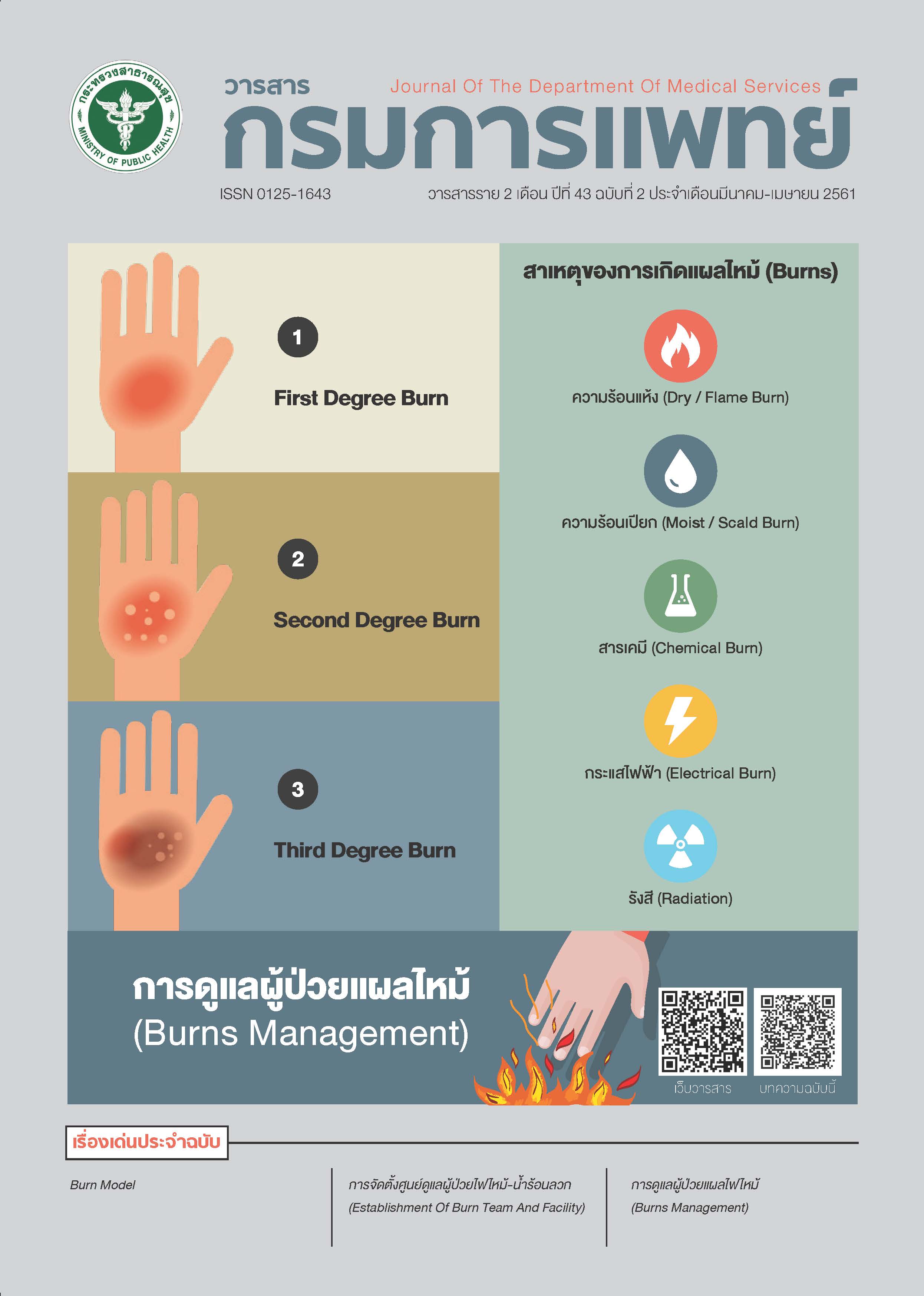Knowledge and Practice of Nurses and Practical Nurses in the Tertiary Health Care Center Regarding Pelvic Organ Prolapse and Urinary Incontinence
Keywords:
Knowledge, Practice, Pelvic organ prolapse, Urinary incontinence, NursesReferences
Haylen BT, de Ridder D, Freeman RM, Swift SE, Berghmans B, Lee J, et al. An International Urogynecological Association (IUGA)/International Continence Society (ICS) joint report on the terminology for female pelvic floor dysfunction. Int Urogynecol J 2010; 21: 5-26.
Manonai J, Chittacharoen A, Sarit-apirak S, Udomsubpayakul U, Khanacharoen A, Theppisai U. Lower urinary tract symptoms in Thai women attending the menopause clinic: prevalence and associated factors. J Med Assoc Thai 2004; 87: 1265-9.
Chuenchompoonut V, Bunyavejchevin S, Wisawasukmongchol W, Taechakraichana N. Prevalence of genital prolapse in Thai menopausal women (using new standardization classification).
J Med Assoc Thai 2005; 88: 1-4.
Farage MA, Miller KW, Berardesca E, Maibach HI. Psychosocial and societal burden of incontinence in the aged population: a review. Arch Gynecol Obstet 2008; 277: 285-90.
Ghetti C, Lee M, Oliphant S, Okun M, Lowder JL. Sleep quality in women seeking care for pelvic organ prolapse. Maturitas 2015; 80: 155-61.
Pierce H, Perry L, Chiarelli P, Gallagher R. A systematic review of prevalence and impact of symptoms of pelvic floor dysfunction in identified workforce groups. J Adv Nurs 2016; 72: 1718-34.
Demarre L, Vanderwee K, Defloor T, Verhaeghe S, Schoonhoven L, Beeckman D. Pressure ulcers: knowledge and attitude of nurses and nursing assistants in Belgian nursing homes. J Clin Nurs 2011; 21: 1425-34.
Babaie M, Hosseini M, Hamissi J, Hamissi Z. Knowledge, Attitude and Practice of Nurses Regarding Organ Donation. Glob J Health Sci 2015; 7:129-37.
Venugopal A, Joshi P, Deka D, Seth T. Knowledge and attitude of nurses regarding stem cells and umbilical cord blood banking in a selected tertiary care facility. Asian J Nurs Edu Res 2016; 6: 240-4.
East CE, Lau R, Biro MA. Midwives' and doctors' perceptions of their preparation for and practice in managing the perineumin the second stage of labour: a cross-sectional survey. Midwifery 2015; 31: 122-31.
Jang Y, Kwon BE, Kim HS, Lee YJ, Lee S, Kim SJ, et al. Knowledge and practice behaviors regarding urinary incontinence among Korean healthcare providers in long-term care hospitals. Int Neurourol J 2015; 19: 259-64.
Saxer S, de Bie RA, Dassen T, Halfens RJ. Nurses' knowledge and practice about urinary incontinence in nursing home care.Nurse Educ Today 2008; 28: 926-34.
Lin SY, Wang RH, Lin CC, Chiang HY. Competence to provide urinary incontinence care in Taiwan's nursing homes: perceptions of nurses and nurse assistants. J Wound Ostomy Continence Nurs 2012; 39: 187-93.
Shah AD, Massagli MP, Kohli N, Rajan SS, Braaten KP, Hoyte L. A reliable, valid instrument to assess patient knowledge about urinary incontinence and pelvic organ prolapse. Int Urogynecol J Pelvic Floor Dysfunct 2008; 19: 1283-9.
Shah AD, Shott S, Kohli N, Wu JM, Catlin S, Hoyte L. Do racial differences in knowledge about urogynecologic issues exist?Int Urogynecol J Pelvic Floor Dysfunct 2008; 19: 1371-8.
Brady MC, Jamieson K, Bugge C, Hagen S, McClurg D, Chalmers C, et al. Caring for continence in stroke care settings: a qualitative study of patients' and staff perspectives on the implementation of a new continence care intervention. Clin Rehabil 2016; 30: 481-94.
Taunton RL, Swagerty DL, Lasseter JA, Lee RH. Continent or incontinent? That is the question. J Gerontol Nurs 2005; 31: 36-44.
Dunivan GC, Komesu YM, Cichowski SB, Lowery C, Anger JT, Rogers RG. Elder American Indian women’s knowledge of pelvic floor disorders and barriers to seeking care. Female Pelvic Med Reconstr Surg 2015; 21: 34-8.
Good MM, Korbly N, Kassis NC, Richardson ML, Book NM, Yip S, et al. Prolapse-related knowledge and attitudes toward the uterus in women with pelvic organ prolapse symptoms. Am J Obstet Gynecol 2013; 209: 481.e1-6.
Liebergall-Wischnitzer M, Cnaan T, Hochner H, Paltiel O. Self-reported prevalence of and knowledge about urinary incontinence among community-dwelling israeli women of child-bearing age. J Wound Ostomy Continence Nurs 2015; 42: 401-6.
Mandimika CL, Murk W, Muhlhauser McPencow A, Lake A, Wedderburn T, Collier CH, et al. Knowledge of pelvic floor disorders in a population of community-dwelling women. Am J Obstet Gynecol 2014; 210: 165.e1-9.
Zhang N, He Y, Wang J, Zhang Y, Ding J, Hua KQ. Effects of a new community-based reproductive health intervention on knowledge of and attitudes and behaviors toward stress urinary incontinence among young women in Shanghai: a cluster-randomized controlled trial Int Urogynecol J 2016; 27: 545-53.
Downloads
Published
How to Cite
Issue
Section
License
บทความที่ได้รับการตีพิมพ์เป็นลิขสิทธิ์ของกรมการแพทย์ กระทรวงสาธารณสุข
ข้อความและข้อคิดเห็นต่างๆ เป็นของผู้เขียนบทความ ไม่ใช่ความเห็นของกองบรรณาธิการหรือของวารสารกรมการแพทย์



